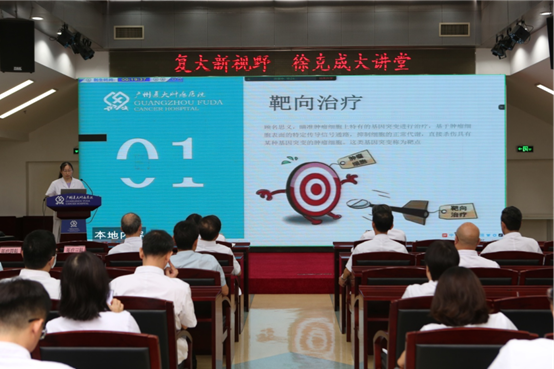In recent years, immunotherapy and targeted therapy have rapidly developed and been widely applied in clinical trials and treatments, emerging as new approaches for cancer therapy. How do they work, and how should we choose between them? Dr. Jiaojuan Shi, Deputy Director of the Medical Oncology Department at Fuda Cancer Hospital in Guangzhou, shared insights on the differences between immunotherapy and targeted therapy during the 76th lecture of "Fuda New Horizons Xuke Cheng Lecture Series."

If we liken tumor cells to weeds in a garden, chemotherapy is like spraying herbicide across the entire garden, which is not precise enough in killing tumor cells. Targeted therapy directly targets the weeds, making it more specific, while immunotherapy enriches the soil to make it fertile and simultaneously removes the weeds.
Targeted Therapy: Precision Strike on Tumor Cells
Targeted therapy is a precision medical approach that targets specific genetic mutations in tumor cells. It inhibits normal metabolic processes and directly kills tumor cells with particular gene mutations by focusing on specific signaling pathways on the surface of the tumor cells. These mutations are known as targets.
Targeted drugs identify and attack unique molecules in tumor cells, such as nucleotide fragments and specific proteins, blocking the growth and replication of tumors. This leads to tumor cells stopping growth or self-destructing.
There are various types of targeted drugs, including angiogenesis inhibitors, monoclonal antibodies, proteasome inhibitors, and signal transduction inhibitors. Common targeted drugs include Gefitinib, Osimertinib, Cetuximab, and Bevacizumab.
Immunotherapy: Activating the Body’s Internal Warriors
Immunotherapy is a method that stimulates and enhances the body’s immune system to fight cancer. It involves various techniques, such as anti-PD1/PD-L1 therapy. In simple terms, immunotherapy involves infusing PD-1 or PD-L1 antibodies into the body. These antibodies bind with PD-1 on T cells or PD-L1 on tumor cells, breaking the tumor cells' disguise and allowing T cells to successfully eliminate the tumor cells.
Differences Between Targeted Therapy and Immunotherapy
1. Mechanism of Action:
- Targeted Therapy: Uses drugs or other methods to directly interfere with or block the growth and spread of tumor cells by targeting specific molecular targets on tumor cells.
- Immunotherapy: Activates or enhances the body’s immune system to recognize and attack tumor cells.
2. Targets:
- Targeted Therapy: Targets specific molecules or signaling pathways on tumor cells to kill or inhibit tumor cells.
- Immunotherapy: Modulates or enhances the immune system to recognize and attack tumor cells.
3. Scope of Application:
- Targeted Therapy: Mainly suitable for specific tumors with identifiable molecular targets. For example, in HER2-positive breast cancer, the targeted drug Herceptin (Trastuzumab) can significantly extend progression-free survival and overall survival. EGFR-sensitive mutation lung cancer patients can benefit significantly from EGFR TKIs.
- Immunotherapy: Immune checkpoint inhibitors are generally applicable to various tumor types, especially those with high immunogenicity, such as melanoma and renal cell carcinoma. Anti-CTLA-4 monoclonal antibody Ipilimumab and anti-PD-1 monoclonal antibody Keytruda have been approved by the FDA for the treatment of melanoma and other cancers.
4. Side Effects:
- Targeted Therapy: May affect similar molecular targets in normal cells, leading to side effects such as hand-foot syndrome and skin inflammation.
- Immunotherapy: Mainly related to immune system activation, such as immune reactions, fatigue, and liver function abnormalities.
5. Onset Speed and Effect:
- Targeted Drugs: Because they directly target and kill cancer cells, they often work quickly. For suitable patients, tumor shrinkage or a decrease in tumor markers can be observed within weeks or even days, significantly improving quality of life and survival rates. However, due to tumor heterogeneity and evolution, resistance often develops after some time, requiring a change of medication. Hence, long-term survival or cure with a single drug is rare.
- Immunotherapy: The response usually takes longer, with many patients starting to see effects after months of treatment. It is recommended to re-evaluate the tumor with CT or MRI every 8-10 weeks to assess the treatment effect. Initially, there might be an increase in tumor size or new lesions, requiring evaluation at 4-6 weeks to distinguish between "pseudo-progression" and "hyper-progression." Although immunotherapy takes longer to take effect, patients who respond often benefit for a long time, with a small percentage achieving long-term survival.
With the integration of various treatment approaches, malignant tumors are gradually becoming controllable and treatable diseases. There is no absolute good or bad between targeted drugs and immune drugs. The key is to understand the characteristics of each drug and whether it suits the patient's condition. The choice between targeted therapy and immunotherapy should be based on various factors, including cancer type, patient’s physical condition, and the biological characteristics of the tumor cells.